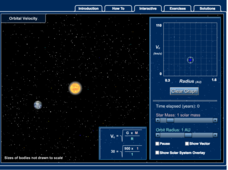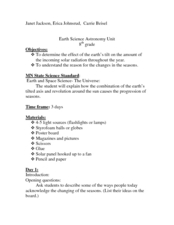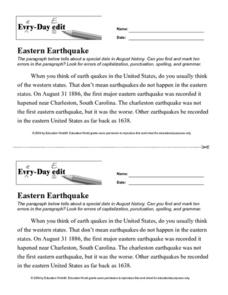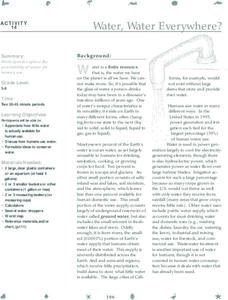McGraw Hill
Orbital Velocity Interactive
Why does it take Pluto 90,000 days to orbit the sun, but it only takes Mercury 88 days? An interactive lesson helps pupils find a connection between the speed of orbit and distance a planet is from the sun. The simulation allows for...
Curated OER
Science Review for Grade 5 (5.2)
In this science review for grade 5 (5.2) worksheet, 5th graders answer 25 earth science questions in a standardized test format, including reading maps and diagrams.
Curated OER
Lunar Learning
Students learn about the phases of the moon. For this moon phases lesson, students learn about what causes the moon to look different to us everyday and how the Earth and Sun's position determine what phase the moon is in.
Curated OER
Johnny Be Good: Earth Day
Students draw a picture of Johnny Appleseed doing something good for the environment. In this philanthropy lesson plan, students listen to a book about Johnny Appleseed and demonstrate their understanding of philanthropy by drawing a...
Curated OER
An Introduction to the Night Sky and Movement Astronomy
Basically, this is an interactive exploration of educational astronomy software and an app. Young astronomers discover how the apparent motion of the sky relates to Earth's movements and the position of the observer. It is out of this...
Earth Day Network
Staying Green While Being Clean
Clean up the environment with a lesson that focuses on replacing hazardous cleaning supplies with green, environmentally-friendly products. Using a dirty patch of surface as a control area, kids clean other parts of various surfaces...
Curated OER
The Water Cycle
Fifth graders explore the major components of the water cycle. They pay close attention to evaporation, condensation, and precipitation. A water cycle kit is set up in the classroom, which learners observe for a couple of days before the...
NASA
Einstein's Gravity
Assist your high school class with researching and applying the principles of gravity so they may further understand why Einstein is so widely recognized, even today. Individuals compare and contrast two different models that demonstrate...
Curated OER
Do We Control Nature, or Does Nature Control Us?
Student examine the theme of man versus nature in art. In this man versus nature lesson plan, students examine various pieces of art and discuss the theme as it is depicted. They discuss whether the themes shown in the artwork are...
Curated OER
Earth Science Astronomy Unit: Seasons on Earth
Eighth graders describe how the Earth's position causes seasonal changes. In this astronomy lesson, 8th graders explain how solar radiation varies depending on the season. They create a collage or poster on each of the Earth's four seasons.
Curated OER
Mother's Day Lesson Plans
Mother's Day lessons provide students a way to learn about art, music, and history.
California Academy of Science
Energy: A Day in My Life
If only we could harness the energy of fifth graders, our energy problems would be over! The class discusses where different forms of energy come from and how we use them. They complete a chart of the activities that they do daily that...
Curated OER
Connect the Spheres: Earth Systems Interactions
Is everything really connected? Take your class on a walk outside, where they will make observations and write them down on a worksheet. Once they are back in the classroom, learners will work to determine if and how things like birds,...
Colorado State University
How Does the Earth Cool Itself Off?
Where does all the heat go when the sun goes down? An interesting lesson has learners explore this question by monitoring the infrared radiation emitted over time. They learn that hot spots cool more quickly that cooler spots.
NASA
Down to Earth
There are only 10 types of people in the world: those who understand binary and those who don't. The lesson includes four activities in which students learn binary, convert binary to images, understand CCD arrays, and interpret...
Curated OER
Don't Let the Earth Down
Writing a persuasive argument starts with a clear thesis. Using this resource, your class will write a persuasive paper on a conservation issue. They will then transform their argument into a 30-second public service announcement. If...
Curated OER
Don't Let the Earth Down
Although recycling is definitely beneficial, reducing our waste and conserving our natural resources should really be the focus of environmentalists. Encourage the future generation to create a public service announcement about a...
Curated OER
Plate Tectonics Day 3 Sea Floor Spreading: Evidence for Continental Drift
Students are introduced to Sea Floor Spreading and how it provides evidence for Hess's and Deitz's theory of Continental Drift. They use paleomagnetic data to calculate the rate of Sea Floor Spreading.
Education World
Every Day Edit - Pluto, the Dwarf Planet
In this everyday editing worksheet, students correct grammatical mistakes in a short paragraph about the planet Pluto. The errors range from punctuation, capitalization, spelling, and grammar.
Education World
Every Day Edit - Eastern Earthquake
In this everyday editing worksheet, students correct grammatical mistakes in a short paragraph about earthquakes. The errors range from punctuation, capitalization, grammar, and spelling.
Curated OER
Reproduction, Day 3: Parenthood
Reproduction can result in parenthood. Discuss the pros and cons, responsibility, and possible results of sexual intercourse. Intended for a secondary special education class, this lesson is developmentally appropriate for mild to...
US Geological Survey
Water, Water, Everywhere?
Less than one percent of the earth's water is available for human use. A hands-on activity models the phenomenon for young scientists. Beginning with a specific volume of water, learners remove water that correlates to the percent of...
BioEd Online
Spiders in Space
Does a spider spin its web differently in space? What other ways might microgravity affect an arachnid? Pick a topic to research, plan an investigation, and follow astronauts on the International Space Station as they perform some of the...
Curated OER
Understanding Climate Change
The young scientists in your class will appreciate a resource about different elements of climate change. The packet includes factual materials, informational text, and clear visuals, perfect for sharing with your environmental science...
Other popular searches
- Earth Day Activities
- Earth Day Writing Activities
- Earth Day Art
- Earth Day Art Project
- Earth Day Writing
- Earth Day Lesson Plans
- Earth Day Lessons
- Earth Day Games
- Earth Day Unit Plan
- Earth Day Participation
- Earth Day Word Search
- Letters for Earth Day

























